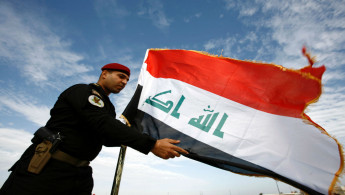US general: We are not here to fight on behalf of Iraq
After the US withdrawal of its combat forces from Iraq just over a year ago, the US officially switched to its new advisory role in assisting Iraqi forces, a role it currently continues as Iraq remains vulnerable to extremism.
On Tuesday, Major General Matthew McFarlane, the commanding general of the Combined Joint Task Force-Operation Inherent Resolve, and Deputy Assistant Secretary of Defense Dana Stroul spoke with reporters about the current US role in Iraq, emphasising the US military's supportive and non-combat role.
"One of the critical aspects of our approach is that in Iraq, we are not here to fight on behalf of Iraq; we are here in a non-combat role to provide the necessary support and resources, advising, assisting, and enabling the Iraqi Security Forces to take the lead in the fight against ISIS," the general told reporters on the telephonic briefing.
"It is a long-term effort as our partners build the independent capabilities and capacity to lead and maintain the fight against ISIS. We're committed to seeing it through until conditions are met," he said.
Stroul added that the US military support system in Iraq has the support of the Iraqi government as well as successive US presidential administrations and Congress.
Indeed, in January, Iraqi Prime Minister Mohammed Shia al-Sudani publicly stated his support for US troop presence in his country. Nevertheless, there remains strong opposition to the remaining US military presence in Iraq of around 2,500 service members.
"We’re committed to maintaining our force presence in support of the enduring defeat of ISIS, and working collaboratively and consultatively with our partners across the region," said Stroul, emphasising the collaborative nature of the current arrangement, though with no indication of how much longer the US might continue its troop presence in Iraq.
When asked by a reporter how the US was working to not only combat the Islamic State, but also its ideology, the US officials noted that the attacks are decreasing, and they are working to help their partners become more independent in addressing threats.
"As we continue to do that, we are also ensuring we’re helping build the capacity and the enduring or independent capability for our partners to take more of these missions on themselves in an independent fashion," said McFarlane.
Throughout the briefing, the officials emphasised the US commitment to Iraq and the rest of the region. There was, however, little mention of addressing causes of extremism, such as poverty and disenfranchisement. And there was no mention of any plans for complete US withdrawal from Iraq.
"We are maintaining our force presence," Stroul said. " We are committed to our partners. And we are expanding ways not only to work with them on a daily basis but enable and empower them to be in the league so that they can independently maintain pressure on ISIS."





 Follow the Middle East's top stories in English at The New Arab on Google News
Follow the Middle East's top stories in English at The New Arab on Google News


